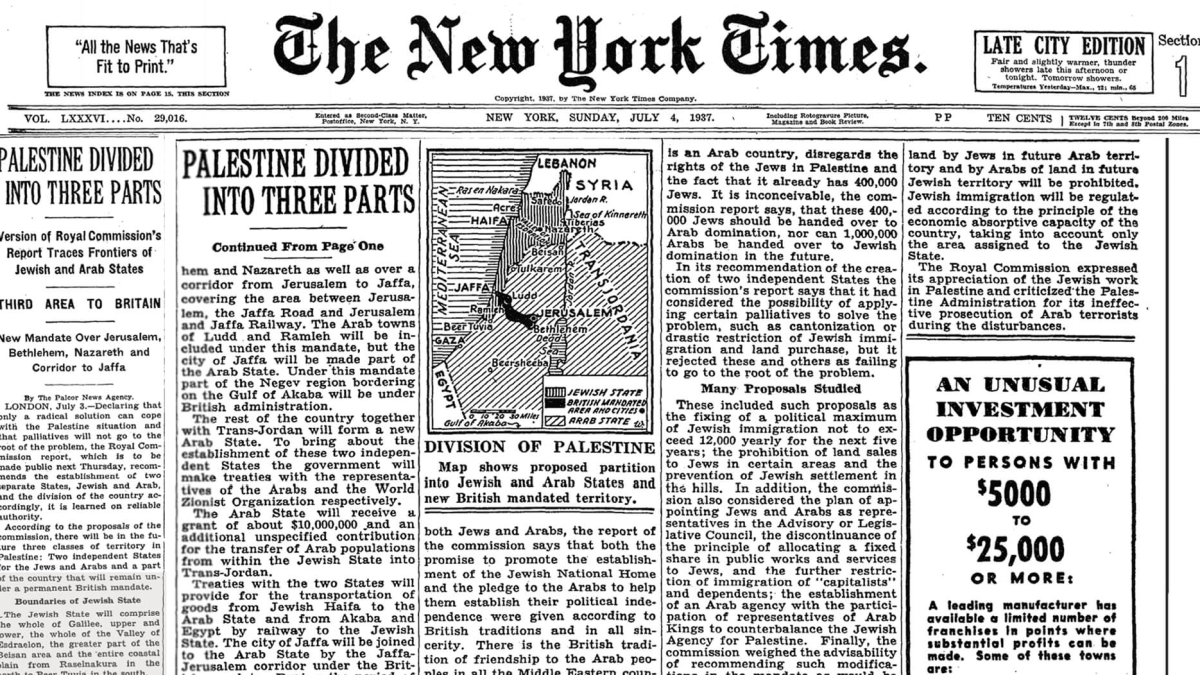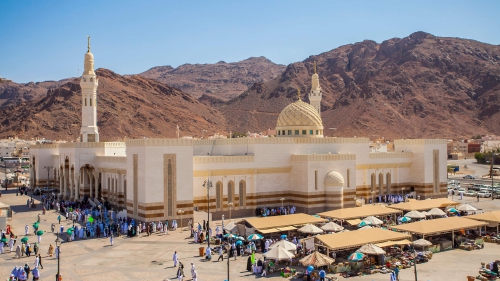Flashback 1937 - Palestine Divided into Three Parts

Following is an article that appeared in New York Times on July 4 1937
Version of Royal Commission's Report Traces Frontiers of Jewish and Arab States
THIRD AREA TO BRITAIN
New Mandate Over Jerusalem, Bethlehem, Nazareth and Corridor to Jaffa
By The Palcor News Agency.
LONDON, July 3. - Declaring that only a radical solution can cope with the Palestine situation and that palliatives will not go to the root of the problem, the Royal Commission report, which is to be made public next Thursday, recommends the establishment of two separate States, Jewish and Arab, and the division of the country accordingly, it is learned on reliable authority.
According to the proposals of the commission, there will be in the future three classes of territory in Palestine: Two independent States for the Jews and Arabs and a part of the country that will remain under a permanent British mandate.
Boundaries of Jewish State
The Jewish State will comprise the whole of Galilee, upper and lower, the whole of the Valley of Esdraelon, the greater part of the Beisan area and the -entire coastal plain from Raselnakura in the north to Beer Tuvia in the south.
The northern frontier of the Jewish State will follow the existing frontier of Palestine along the southern boundary of Lebanon from the Mediterranean to Syria. The frontier continues along the present boundary of Syria along the Jordan River and the Sea of Kinnereth to a point north of the town of Beisan. The boundary of the Jewish State turns west along the southern edge of the Valley of Esdraelon to Megiddo, then runs south along the edge of the coastal plain in the foothills with an arc excluding the Arab city of Tulkarem. Thus, it is proposed that all Jewish settlements in Trans- Jordan, namely, the two Deganias, Gesher, Nahataim, and others should be included in the Arab State.
The important harbor city of Haifa will belong to the Jewish State. About 225,000 Arabs, besides the Arab population of the towns of Safed, Acre, Haifa and Tiberias, will be included in the Jewish State enclosed by these boundaries. For some time to come these towns, which are part of the Jewish State will remain under a temporary mandate of Great Britain, and their Arab population will not be obliged to assume Jewish citizenship as long as the mandate in force.
The second territorial division of the country will go to Great Britain, which will receive a new permanent mandate over Jerusalem, Bethlehem and Nazareth as well as over a corridor from Jerusalem to Jaffa, covering the area between Jerusalem, the Jaffa Road and Jerusalem and Jaffa Railway. The Arab towns of Ludd and Ramleh will be included under this mandate, but the city of Jaffa will be made part of the Arab State. Under this mandate part of the Negev region bordering on the Gulf of Akaba will be under British administration.
The rest of the country together with Trans-Jordan will form a new Arab State. To bring about the establishment of these two independent States the government will make treaties with the representatives of the Arabs and the World Zionist Organization respectively. The Arab State will receive grant of about $10,000,000 and an additional unspecified contribution for the transfer of Arab populations from within the Jewish State into Trans-Jordan.
Treaties with the two States will provide for the transportation of goods from Jewish Haifa to the Arab State and from Akaba and Egypt by railway to the Jewish State. The city of Jaffa will be joined to the Arab State by the Jaffa- Jerusalem corridor under the British mandate. During the period of transition the country will remain under the Central British Government.
The present régime, according to the commission, cannot continue because it must lead to endless troubles. It is the opinion of the body of inquiry which went to Palestine last November under the chairmanship of Earl Peel to investigate the administration of the League of Nations Mandate that the national aspirations of the Jews and Arabs in Palestine are irreconcilable and that the hope once entertained of combining them has not been fulfilled.
Promises Reviewed
Reviewing the promises that were made by the British Government to both Jews and Arabs, the report of the commission says that both the promise to promote the establishment of the Jewish National Home and the pledge to the Arabs to help them establish their political independence were given according to British traditions and in all sincerity. There is the British tradition of friendship to the Arab peoples in all the Middle Eastern countries and there is also the tradition of British sympathy toward the Jews, and it is in the interests of the British to retain the confidence of the Jews.
The report declares that the national aspirations of these two peoples are irreconcilable, because the Arabs want to establish their own empire, while the Jews claim full freedom to recreate Palestine and return to their historic homeland without being subject to limitations. The Jewish Agency insisted before the Royal Commission that the mandate be carried out in full and that Jewish immigration into Palestine be increased.
Neither of these claims can be accepted, the commission finds. The claim of the Arabs, that Palestine is an Arab country, disregard the rights of the Jews in Palestinian and the fact that it already has 400,000 Jews. It is inconceivable, the commission report says, that these 400,000 Jews should be handed over Arab domination, nor can 1,000,000 Arabs be handed over to Jewish domination in the future.
In its recommendation of the creation of two independent States the commission’s report says that it had considered the possibility of applying certain palliatives to solve the problem, such as cantonization or drastic restriction of Jewish immigration and land purchase, but it rejected these and others as failing to go to the root of the problem.
Many Proposals Studied
These included such proposals as the fixing of a political maximum of Jewish immigration not to exceed 12,000 yearly for the next five years; the prohibition of land sales to Jews in certain areas and the prevention of Jewish settlement in the hills. In addition, the commission also considered the plan of appointing Jews and Arabs as representatives in the Advisory or Legislative Council, the discontinuance of the principle of allocating a fixed share in public works and services to Jews, and +he further restriction of immigration of ' 'capitalists" and dependents; the establishment of an Arab agency with the participation of representatives of Arab Kings to counterbalance the Jewish Agency for Palestine. Finally, the commission weighed the advisability of recommending such modifications in the mandate as would be required to enable the mandatory government to introduce the above- mentioned changes.
All of these plans were rejected by the commission, asserting that a radical solution was necessary and that such a solution could be found only in the establishment of two separate States and the division of the country between Jews and Arabs.
All of these plans were rejected by the commission, asserting that a radical solution was necessary and that such a solution could be found only in the establishment of two separate States and the division of the country between Jews and Arabs.
The existing Advisory Council is to be enlarged with the appointment of additional representatives of the Jewish and Arab peoples. If any of them should refuse to serve, a representative of the other will be appointed, nevehtheless.
During the interval of adjustment and the establishment of the independent States the acquisition of land by Jews in future Arab territory and by Arabs of land in future Jewish territory will be prohibited Jewish immigration will be regulated according to the principle of the economic absorptive capacity of the country, taking into account only the area assigned to the Jewish State.
The Royal Commission expressed its appreciation of the Jewish work in Palestine and criticized the Palestine Administration for its ineffective prosecution of Arab terrorist during the disturbances.

















